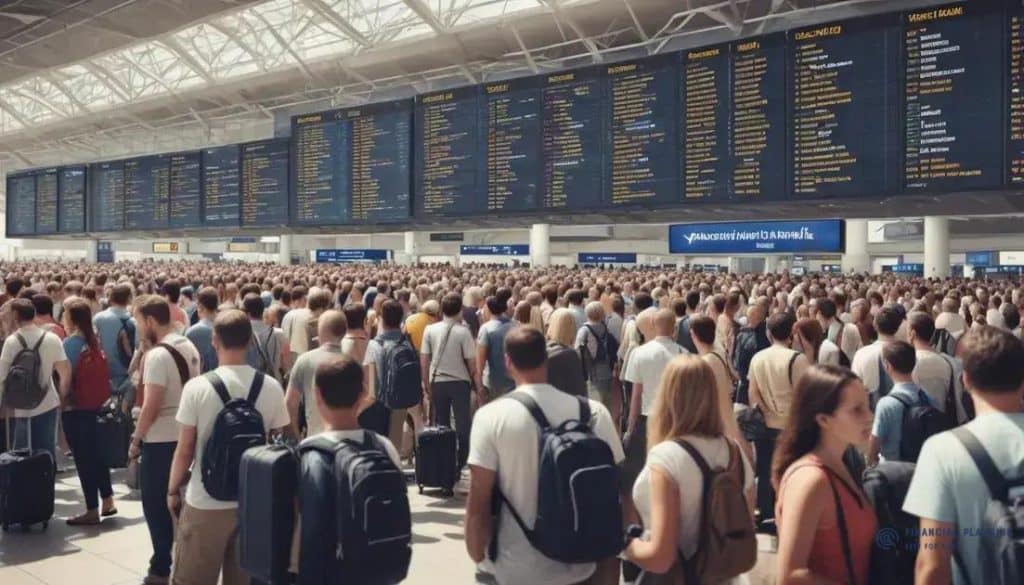FAA Summer Delays 2025: Travel Tips and Advice

FAA delays and summer travel chaos in 2025 can disrupt plans for travelers. Staying informed about flight statuses is essential. Understanding cancellation policies can save time and money.
Preparing in advance helps manage the impact of delays. Travelers can reduce stress by monitoring flights online. Being flexible with itineraries ensures smoother experiences.
Awareness of potential disruptions is key. Families and solo travelers alike benefit from proactive planning. Summer 2025 is expected to challenge travel systems nationwide.
Understanding FAA delays: Causes and implications
FAA delays often result from weather conditions and congestion. Storms, fog, and heavy rain can disrupt flight schedules. Multiple airports may experience cascading delays.
Technical issues also contribute to FAA delays. Aircraft malfunctions require thorough checks before departure. Failures in air traffic control systems can halt operations.
Staff shortages, runway maintenance, and long security lines add further delays. Travelers should allow extra time when planning. Monitoring flight updates helps reduce stress at airports.
Technical Issues
Aircraft problems can cause significant FAA delays. Mechanical issues must be resolved to ensure safe departures. Delays may occur while waiting for repairs or inspections.
Air traffic control system failures also affect operations. Planes may be held on the ground or in the air. Airlines prioritize safety over schedule adherence.
Being aware of technical issues helps travelers plan better. Checking flight status before leaving home is crucial. Extra time at airports minimizes frustration and stress.
Implications of Delays
FAA delays can cause missed connections and added costs. Travelers may need to pay for hotels or rebooking fees. Delays also impact overall travel satisfaction.
Frustration is common during long waits. Staying informed through social media and airline apps is helpful. Passengers can adjust plans and expectations effectively.
Patience is key for navigating disruptions. Understanding potential delays reduces stress. Proper planning improves the overall travel experience.
Tips for travelers during peak summer season
Traveling during peak summer can be exciting yet challenging. Crowded airports and high demand make planning essential. Knowing some practical tips can improve your travel experience.
Booking flights and accommodations early is highly recommended. Popular destinations fill quickly in summer months. Planning ahead saves money and ensures better options.
Flexibility is also important for summer travel. Delays or cancellations can disrupt plans. Allow wiggle room in your itinerary to reduce stress and frustration.
Pack Smart
Packing wisely can make your trip more comfortable. Choose lightweight clothing and comfortable shoes for long days. Stay prepared for various weather conditions.
Bring essentials such as a reusable water bottle to stay hydrated. Portable chargers help keep devices functional during long trips. Protect yourself with sunscreen and a hat in sunny climates.
Snacks and small travel necessities are valuable for flights and road trips. Being organized reduces stress during unexpected delays. Smart packing contributes to a smoother travel experience.
Stay Updated
Staying informed about your flight status is crucial. Apps from airlines provide real-time updates, which help manage expectations. Knowing delays early can save time at the airport.
FAA delays may affect your summer travel plans. Checking notifications frequently ensures you can adjust accordingly. This helps minimize missed connections or rescheduling issues.
Arriving early at the airport is recommended. Security lines and check-in procedures can take longer during peak season. Patience and preparation help make your travel experience less stressful.
Navigating cancellation policies effectively

Cancellation policies can be confusing, especially when plans change unexpectedly. Understanding them is crucial to avoid losing money. Being aware helps travelers manage rescheduling efficiently.
Reading the cancellation policy carefully before booking is essential. Airlines and hotels have varied rules that affect refunds and changes. Knowing the details can save time and frustration later.
Some tickets, such as basic economy, offer less flexibility. Travelers should check restrictions before purchasing. This ensures a smoother experience if plans shift suddenly.
Key Points to Note
Review policies for deadlines, refunds, and fees. Many airlines have specific timeframes for free cancellations. Being aware allows travelers to act promptly if needed.
Understand if refunds or credits for future flights are possible. Knowing this protects your investment and allows better planning. Travel insurance may add another layer of coverage.
Be cautious with last-minute changes, as fees may apply. Policies differ across airlines and accommodations. Staying informed minimizes stress when adjustments arise.
Communicating with Customer Service
If you need help, contact customer service promptly. Airlines have dedicated teams for cancellations and inquiries. Having booking information ready speeds up the process.
Remaining polite during communication is important. Agents are more willing to help courteous travelers. This can make navigating unexpected disruptions easier.
Travel insurance can cover unexpected changes, like illness or emergencies. Understanding coverage ensures added protection. It allows travelers to handle uncertainties more confidently.
The role of airlines in managing chaos
Airlines play a critical role in managing travel chaos. Busy summer seasons increase passenger volumes and potential disruptions. Preparing adequately is key for smooth operations.
Staffing is essential to manage high traffic efficiently. Having enough personnel prevents long lines and confusion. FAA delays can worsen without proper management.
Airlines must plan carefully for peak travel. Operations should remain flexible to accommodate unexpected changes. This ensures passengers are assisted promptly and effectively.
Proactive Communication
Airlines should communicate updates about flight statuses clearly. Social media and apps provide real-time information. This helps travelers adjust plans quickly.
Push notifications and live chat support improve passenger awareness. Quick updates reduce anxiety during disruptions. FAA delays make proactive communication even more important.
Tools to track flights easily help reduce missed connections. Passengers benefit from timely updates and guidance. Clear communication fosters trust during stressful periods.
Handling Delays Effectively
Airlines need clear protocols for delays and cancellations. Helping affected travelers find alternate flights is essential. Flexibility in rebooking ensures satisfaction.
Compensation for significant delays can ease frustration. Meal vouchers or future flight credits show commitment to service. This is especially valuable during FAA delays.
Providing support during disruptions strengthens passenger loyalty. Clear procedures help manage expectations. Travelers appreciate airlines that act swiftly and fairly.
Future of air travel: Improvements and expectations

Air travel is evolving with technology to enhance passenger experience. Airlines and airports adopt innovations to streamline operations. Travelers benefit from more efficient services.
New aircraft designs aim to reduce fuel use and emissions. This lowers costs for airlines and can translate to cheaper fares. Environmentally friendly planes are becoming the norm.
Airports are implementing automation like check-in kiosks and biometric screening. Boarding processes are faster, reducing time in lines. Travelers enjoy smoother airport experiences.
Enhanced Airport Technology
Smart security systems adapt to passenger flow. Mobile apps help navigate airports effectively. Contactless payments improve convenience for dining and shopping.
Automation reduces friction during travel. Passengers can focus on their journey instead of waiting. Technology is increasingly important as FAA delays continue to affect schedules.
Airports aim for more enjoyable experiences through innovation. Travelers benefit from reduced stress and efficiency. Continuous improvements make travel smoother overall.
Sustainability Efforts
Sustainability is a growing focus for airlines. Biofuels and hybrid engines help reduce air travel’s carbon footprint. Travelers increasingly prefer eco-conscious options.
Carbon offset programs allow passengers to support environmental projects. Understanding these options encourages participation in greener travel. Airlines promote sustainable journeys for all.
Environmental investments are important as air travel grows. Passengers can enjoy trips while contributing to conservation. Sustainability efforts complement innovations in flight and airport operations.
FAQ – Common Questions About Traveling During Peak Seasons
What should I do if my flight is delayed?
Check your airline’s app or website for updates and communicate with customer service for assistance on rebooking or compensation.
How can I avoid long lines at the airport?
Arrive early, utilize online check-in, and consider using expedited security programs to speed up the process.
Are there ways to travel more sustainably?
Yes, choose airlines that use eco-friendly practices like biofuels and participate in carbon offset programs.
What is the best way to stay informed about my travel plans?
Use travel apps that provide real-time notifications and updates about your flights and any potential changes.





